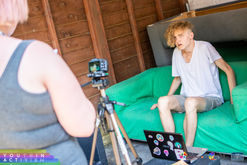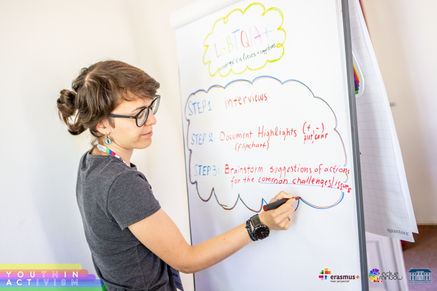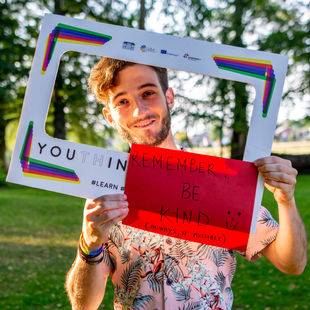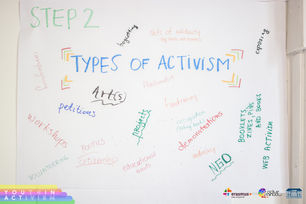

YOUth in ACTivism APV
YOUth in ACTivism APV (Advanced Planning Visit) took place in Ommen, the Netherlands between 3rd-4th of July 2018.
16 individuals from the 8 participating countries of the project met together, in order to start preparing themselves and the main event - the Exchange in August.
During the visit, the inspiring Activists:
-
Got to know each other, bond and network
-
Experienced different non-formal and informal learning methods - fostering theirs and each other's learning
-
Exchanged about the LGBTQIA+ realities of each other's countries, discovering similarities and differences
-
Took their first steps in their pathway to exploring activism - definition, types of it and what does it take to be an activist
-
Put in practice their media skills and produced their first tutorial videos on different topics of their interest, about the LGBTQIA+ Spectrum and activism

hOW DID IT LOOK LIKE?

meet the activists
You have a wonderful opportunity to get to know the next Changemakers & innovators - our amazing participants and team leaders with their message to the world and to YOU!


tUTORIAL VIDEOS
This year's Youth Project is based on the idea of exploring and practising Activism.
During the Visit, participants and team leaders identified "online" activism as one of the major types for taking action to effect social change in our nowadays digitized world.
In their small teams, the group seized the opportunity to work on different topics about the LGBTQIA+ Spectrum and activism in an interactive way - becoming themselves videomakers and producing a series of tutorial videos, transferring their knowledge and experiences.
How to come out of the closet
Is it your first coming out process ever? Check this out!
How to come out of the closet is a video mostly targeting young people, probably teenagers or young adults, and in general people who identify themselves as a LGBTQIA+ member and yet they are in the closet.
To begin with we might mention what coming out of your closet means. Well, coming out is a metaphor for LGBT people's self-disclosure of their sexual orientation or of their gender identity or both. It might be that you are still processing your identity and you ‘re not yet sure about it. The one thing that a LGBTQIA+ person might know for sure is that they don’t fit in the so called academically “heteronormative” or/and “cisnormative” reality. There has been a lot of academic rhetoric and public speech about psychological effects of being oppressed cause of your sexual or gender identity. We should mention here that there are some countries where it is impossible to come out in public and not get a penalty of committing a crime.
Nevertheless, this doesn’t mean that in countries where it is not penalized to be a LGBTQIA+ person, it is easier or more comfortable to come out. Afterwards, it is not the same process for every person. For some, it’s a straightforward process and they don’t mind telling their friends and family. But for others, it’s not so easy. Whatever the reason, coming out can sometimes be complicated. We should also take into account different backgrounds and a variety of intersections that interfere with each other like social class, gender, ethnicity, etc.
Whatever the circumstances are we can state somehow that there are some basic “principles” of doing your first coming out.
Hopefully, we believe that you can watch those basic steps for how to come out in our video.
To sum up the most important things you have to take into consideration are that you are pretty sure you want to come out and that you take care of yourself. If it makes you feel stressed and not ready yet, wait until it’s the right moment for you, not because someone else points out that you ought to do it. Secondly, regarding self-care make sure that you will have someone you trust to lean on in case anything goes extremely negative to your coming out –mostly to your parents if you are a minor.
Have in mind that you can always find some help in person or online. In some cities, local organisations run workshops for coming out, or you can find online to call for helplines. You are never alone, you can find a support system. All you have to do is to address to a trustworthy and supportive person or an organisation.
Give people the time to process it. Not everyone can handle it the same. It goes as for the people who come out. Neither for them is the same to all of them. So calm down if the first reactions are not welcoming. In case of offending you or making you feel bad, you can always walk away. Maybe it’s all new to them or it’s completely against their expectations. All that matters in the end is that you take care of yourself and you will find the way step by step. It is/was just your first coming out, it’s not going to be the last one. Believe us. You never really finish the coming out process.
- Erianna, Ilze, Michaela.
Self-care is one of the most significant topics in 21st century. We’re living in world where information is spread so much all around us and our brains are still getting suited for the amount of information.
There are so many political and social challenges in society. Some people have not so endurant brain functioning that it leads them to multiple vegetative (nerve) problems. To add, the information around us can be taken differently by environmental factors - some information can be difficult to tackle for a person, for example, emotional break-up or a big workload can damage the health of nerves. To show up how to keep yourself a fresh mind we’ll share some recommendations.
- Jekabs, Juste, Janja, Andrew
Self-care

Have a look further on the outcomes and video creations and maybe some of the information is really useful to you as well, like how to take care of yourself and not to overwork, what is polyamory and how does it work, what is the difference between gender and sex, or maybe how to "come out of the closet"?

gender and sex
For some sex and gender topic is really confusing. Even the LGBTQIA+ community tends to make mistakes while talking about this topic.
For a very long time, the words “gender” and “sex” were used interchangeably, but that is not only no longer the case, but also nowhere close to the truth. So… for those who want to progress with the times and embrace the full spectrum of human identity, a common question arises: what is the difference? With this video we tried to explain the differences between biological sex, gender identity and gender expression. Please know that we are not professional video makers. We thought about this video as a quick lesson and a test try.
How to understand gender and sex.
Look at this person. If we draw it pink, you would probably assume it's a girl and if we draw it in blue, you would say it's a boy. But it's far more complicated than that. There's a difference between sex, gender identity and gender expression.
Let's start out with biological sex! Biological sex refers to reproductive organs, hormones and chromosomes. It's all about the person's physical body. There's male and female, but also intersex people, which means someone has both or neither male or female sex characteristics. In that way biological sex becomes a spectrum.
You shouldn't confuse gender with biological sex. Gender can be divided to gender identity and gender expression. Gender identity is a person's internal sense of being male, female, some combination of male and female, or neither male nor female. It's mostly how you feel inside. Also, there are people that don't identify or don't fit in the box of male or female. They consider themselves for example non-binary, genderqueer or etc. If your biological sex matches your gender identity, then it means you're cisgender. If not, you're transgender. This is an umbrella term, for example people who are born with male sex characteristics and identify as female.
Gender expression is the way someone dresses, behaves, acts, reacts and interacts with other people based on traditional gender norms. It doesn't necessarily represent their gender identity or biological sex.
This means that someone can identify as female, but express themselves in a masculine way and still be considered female.
If you're confused about a person's sex or gender, the best thing you can do is simply ask how they want to be approached. Also keep in mind that person's sexual orientation doesn't necessarily have anything to do with their biological sex, gender identity or gender expression.
- Fiona, Umiko, Annemijn
Self-care 101
Tired after watching 15 hours of Netflix and not understanding why you are exhausted? Is the pressure of societies expectations weighing you down in the morning? Have noticed bags under your eyes after working on that one project without sleeping? Sounds like you need some self-care...
Self-care is your expression of loving yourself and treating your body and mind with the respect they need. Consider both your basic needs and long-term health.
LGBT is a spectrum and so is self-care. First of all - let's look at the basic things:
-
Breathe - look up some breathing exercises. It is proven that mindful breathing help with anxiety and can also improve your overall state. Practice this when feeling calm and put your skills in action when it comes to stressful situations.
-
Drink water - your body needs hydration. Drink when you are thirsty. Increase the amount of water when it gets warmer or you exercise.
-
Eat - if you are hungry, eat! Listen to your body from time to time. Are you craving anything particular? Also - watch the food you put in your body and the time you do so. Midnight snacks after all will disturb your sleep. Avoid processed foods and stick to the ones that will benefit your body not harm it.
-
Rest - again, listen to your body, have enough sleep, take breaks and time to relax.
-
Take a shower - helps not only to keep your hygiene in check but also can help you reset your thoughts.
-
Physical contact - pets, people, pillows - they can help you feel better!
-
Fun activities - just keep yourself happy.
Moving on to the more hardcore stuff. These things can make you feel worse at first but they have tremendous beneficial effects on your long-term health.
-
Come out in a safe space - find support in your friends, family and society as a whole.
-
Resolve toxic relationships - have that friend that always makes you feel bad or an abusive partner. There are resources available to you. Resolve these things in a safe manner and free yourself from the negative impact. You are your own best friend and boss. No one can take that away or make you feel bad.
-
Seek professional help - your friends might be good listeners but they are not therapists. If you need then do not hesitate to get help. Again - check the resources available in your area or online.
-
Learn and explore your boundaries - what is OK to you and what is not. You can decide to push yourself or not - the world is a sandbox and you have the shovel to build your castle.
All in all - respect yourself. You deserve that as a human. Do not let you or anyone else make you feel bad. Take care and self-care!
Links for better self-care:
drweil.com | everyoneisgay.com | gsafewe.org | autostraddle.com
- Gabriela, Linda, Shiki, Adriano
We are not afraid of commitment,
we just love to love
“I think I fall in love a little bit with anyone who shows me their soul. This world is so guarded and fearful. I appreciate rawness so much!“ wrote writer Emery Allen.
Truly, it is not unusual to be in love with more people at once. As much as attraction is biological and not really under our control, it is also not possible to control who we fall in love with.
But we can decide our actions.
Take our choices.
We can choose to follow the life-style dictated to us by social norms.
We can choose to stay with one person forever and suppress feelings we have for others.
We can break up and start new relationships while being heartbroken for losing someone else we loved.
We can cheat, like 35 % of people from Western society.
We decided differently.
We openly stated that we are able and we do love more people at once and that we want to be with them all if they can be with us.
With honesty.
With openness.
With trust.
We are polyamorous.
We don’t lie to others about our relationships. We are ok with our partners having other partners – and if we are not, we talk with them about it.
Our values aren’t based on monogamy, but it doesn’t mean we are unable to stay with somebody for the rest of our lives.
We don’t want to fuck around with everybody we just met. We just love to love.
It doesn’t make us weird. We aren’t different than you. We just have different lifestyle. It is normal. Someone is working 12 hours day, someone makes a business, someone doesn’t work at all. Somebody travels, other stays home. One starts a family, other doesn’t.
Somebody has one partner. We have many.
We are as common as you are.
We don’t convert you. We don’t judge you. We don’t tell you how you should behave or live your life.
Please, do the same for us.
- Vojta, Iva, Emanuele, Andriana

pathway to activism
They got the chance to share and exchange their knowledge and experiences - defining what activism means for them, what are the types of activism one can experience and practice, what are possible qualities and competencies for a person to be an activist - underlying that anyone can be an activist - what are the positive and negative aspects of doing activism, as well as how activism within the LGBTQIA+ Spectrum looks in their different countries around Europe.
An act of being yourself (if in a state of oppression) or taking action to reach a change of policy
Actions towards change in society
Taking an action to try to achieve change for the better!!
ACTIVISM
STEP 1

Individuals
Action
Action
Community
Community
Another significant result from the preparatory meeting, which set the foundation and framework for the Exchange was the implementation of the original method "Pathway to Activism".
In their small teams participants and team leaders made their first steps into exploring Activism and its connection with the LGBTQIA+ Spectrum.
STEP 2
Types of activism
-
Supporting existing safe spaces
-
Artistic expression
-
Flashmob
-
Strikes
-
Individual / Group protests
-
Lobbying
-
Online - Social media, News, Campaigns
-
Community buildings
-
Educational
-
Protests
-
Radical
-
Exposing
-
Acts of solidarity ( e.g. food not bombs)
-
Boycoting
-
Petitions
-
Campaigning
-
Workshops
-
Volunteering
-
Politics
-
Citizenship
-
Slacktivism
-
Charity
-
Public Speaking
-
Fundraising
-
Advocasy
-
Booklets, Magazines, pins, books
-
NGO
-
Passive Activism (wearing something)
-
Supporting activism (financial, allies, supportive behavior)
-
Internet Activism (Including not body-abled people or people at risk)
-
Educational activism (lectures, workshops)
-
Street activism (marching, protesting, parades, festivals, street art,...)
STEP 3
the
activist
-
Authenticity
-
Initiative
-
Accountability
-
Emotional health
-
Knowledge
-
Own-minded
-
Ability to deal with disappointment
-
Empathy
-
Values
-
Commitment
-
Emotional inteligence
-
Acceptance
-
Consistance
-
Willing to learn
-
Good listener
-
Organisational skills
-
Rational thinking
-
Empathy
-
Willing to take steps
-
Leadership and public speaking
-
Endurance
-
Flexible
-
Creativity
-
Charisma
-
Passionate
-
Open-minded
-
Perspective
-
Patient
-
Mentally strong
-
Critial
-
Self-determined
-
Communicative
-
Brave
-
Pro-active
-
Motivated
-
Life long learner
-
Team player

STEP 3
pros & cons
-
Sense of purpose
-
Creating, sustaining community
-
Different experiences
-
Making connections (net-work)
-
Gaining skills & knowledge
-
Working with other people
-
Community & support
-
Socially active
-
Voice, Sharing
-
Sentiment & unity
-
Visibility
-
Seeing, being part of the change
-
Celebrating events
-
Fullfillment
-
Adventure
-
Pride
-
Personal growth
-
Fun
-
Extremism
-
Burn-out
-
Physical, emotional, psychological risks
-
It takes resources
-
Losing your temper
-
Minority stress
-
Professional issues
-
Dealing with conservative relatives, ignorance
-
Pshychological pressure
-
Stereotyping
-
Workload
-
Imprisonment
-
Exposure
-
Failure
-
Judgement
-
Death
-
Exposed to unproductive criticism
-
Hate speech
-
Enemies
-
Danger job opportunity
-
Risk of exclusion
STEP 4
activities
in our countries (realities)
Czech Republic
-
Low-scale street actions
-
Lack of continuity
-
Tendency for “easy” actions (online petitions, etc.)
-
Petitions (same sex marriage)
-
“Jeden Svet” - One World film festival, controversial topics festival “Through Fingers”
Spain
-
Internal fights & divisions between movements
-
A lot is happening online
-
We lack street actions
-
Some activism seems to belong to the “educated elites”
-
Protests (Women's march, Titiritero, singers)
-
Protesting against magazine censorship (Eljueves)
Slovenia
-
Organizing events (festivals)
-
One Pride march
Poland (extra)
-
Marches and NGOs parades (but under attack)
Greece
-
In a formal / educational way
-
LGBTQIA+ community excluding itself
-
Individuals performing activism mostly via social media - they become public persons
-
Street actions when it has to do with political activism.
-
There are specific organisations
-
Feministic actions and policies against sexism, homophobia & transphobia organised by LGBTQIA+ teams and feminists
-
Actions by multiple units. Variety of teams taking action in different cities
Lithuania
-
Poor protesting culture
-
Pro-propaganda law
-
Workshops and educational events
-
Ignorant people (not active)
-
Conservative government as people don’t vote
-
Influence from Russia and Poland
-
Large inequality (people are poor and drinking)
Italy
-
More than 20 prides per year
-
Strong protesting culture in “red” regions
-
Many “LGBTQIA+” associations, linked loop between each other
-
” Rainbow parents”, “ Arcigay”, “LGTBQIA+ migrant association”
-
Feminism movement linked to the international one (non una di meno)
France (extra)
-
Very active (sometimes too much)
-
Sense of community (French way)
-
Strikes
Netherlands
-
Freedom of speech
-
Lots of type of activism, including petitions and protests
Latvia
-
Small scale
-
Focuses on the “fun parts”
-
For the “elite people”
-
Not outside of capital city
-
Protests (only big ones are visible)
-
Social media campaigns
-
Goverment organized commercials - posters, TV, Radio
-
Little visibility
-
Pride parade is growing
-
Little impact outside of the community





























































